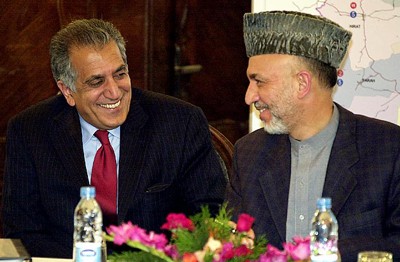
It took a matter of hours for President Hamid Karzai’s administration to deny the rumor that his government was to take on former U.S. ambassador Zalmay Khalilzad as a CEO or ‘unelected prime minister’ of the central Asian state. The New York Times reported yesterday, based on unnamed American and Afghan officials, that Karzia would bring the Afghan born, American citizen Khalilzad on to help him govern the fractured state, but today Karzai’s spokesman said this was false. “We are not aware of this. We cannot confirm this. There is no truth in it,” spokesman Siyamak Herawi said.
Khalilzad, a former US ambassador to Afghanistan and Iraq, is an influential politician and figure in Afghanistan and has friends throughout the region. While he was the US ambassador to Afghanistan from 2003-05 he was a powerful figure, as could be expected as the US took out the previous rulers of the state, the Taliban, and helped place the current government led by Karzai in power, and there were rumors that he may run for president against Karzai, but that time has passed.
If Khalilzad did take on an important executive role in the new government it could have many benefits, but also several pitfalls. As ambassador to Afghanistan and Iraq he showed he could deal with stressful, fractious situations and people in an effective manner and this tough leadership is needed by the boatloads in Afghanistan today. The central government needs to show it can provide for its citizens and Khalilzad may be able to get the state’s engines humming a little tighter and efficiently. Khalilzad’s American connection can also be valuable as the Afghan-US partnership has never been more integrated and important for the nation’s future. Of course it is this strength that will also be a major hangup to Khalilzad actually becoming part of the solution in Afghanistan as there are valid fears that his place in government will further create the feeling that the US is dominating the Afghan state. The Afghan people need to feel that they have a say in how their government is run and that it is not really controlled from across the globe by people who may not share their interests. One can easily see the Taliban and other groups criticizing the appointment as proof that the US plans to dominate Afghanistan for years to come.
It is for these reasons that Karzai may be backing off the idea right now, or at least waiting until after the election in August. We shall see.